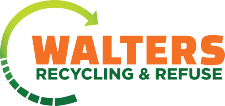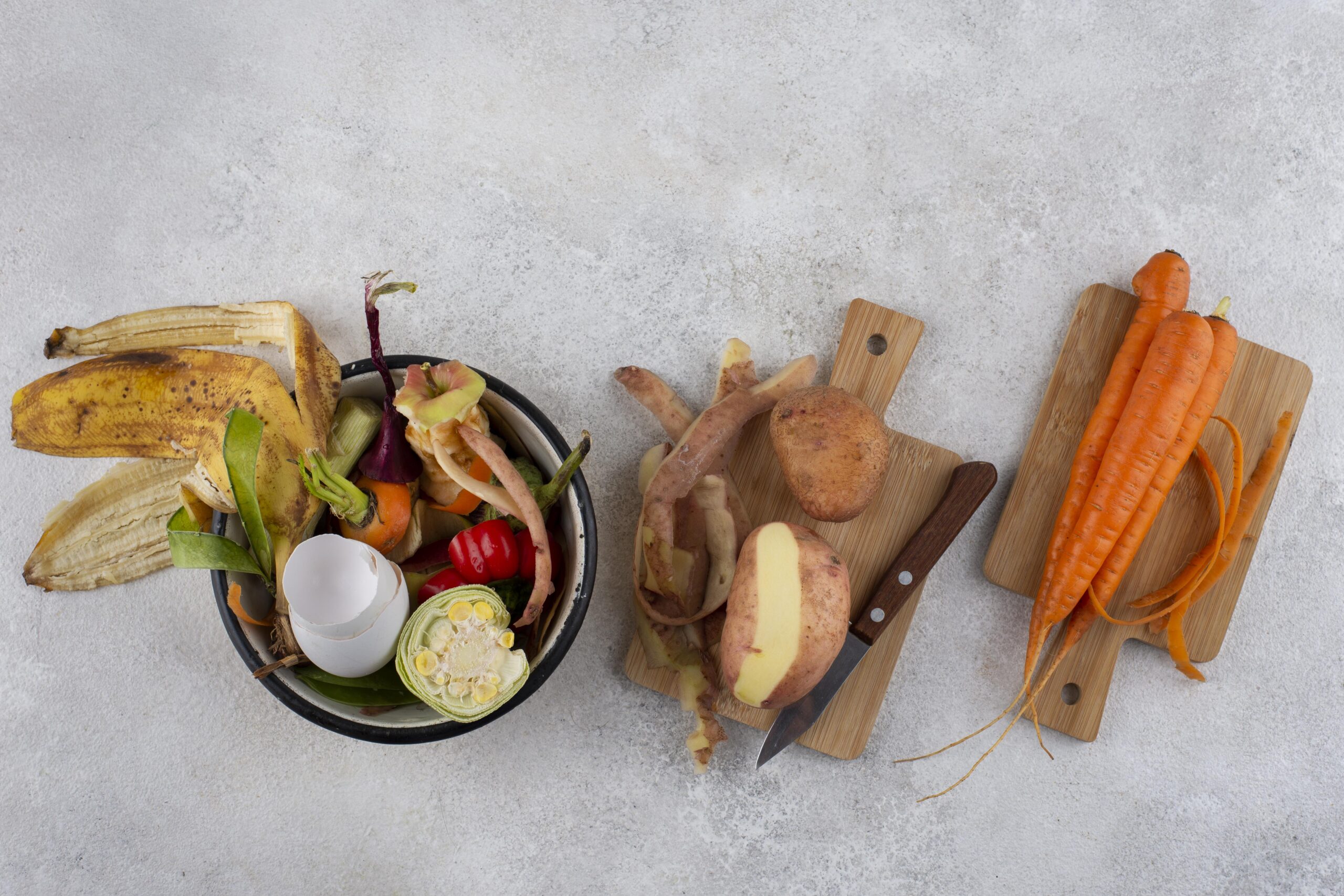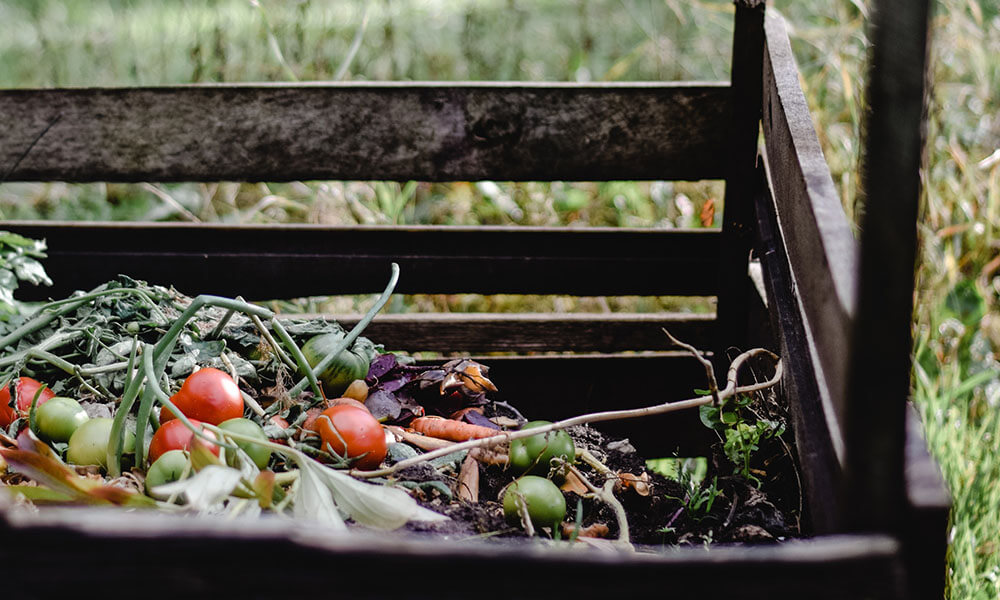Quick LInks
How to get started
Acceptable & Non-Acceptable Materials
Tips
FAQ’s
Guide to Getting Started
You’re ready to start organics recycling at home. Great!
You will generally need a collection container and compostable bags. You can choose a container and location that works best for you.
- Select an indoor collection container. There are many options for containers you can use to collect organics recycling in your home – some you may already have. You can use an ice cream pail, coffee can, or cottage cheese container. You can convert an existing garbage can into an organics container. You can purchase a kitchen pail from a grocery, hardware, or retail store or order one online.
- Separate your food scraps, coffee grounds, paper towels, tissues, and other organics into a BPI-certified compostable bag in your home. Spoiled food and food scraps are the most common materials in the trash, which makes them the most essential material to start collecting for organics recycling. We have provided some additional tips or best practices below on how to set up your organics collection at home.
- Put your hand-tied bagged organics into the organics recycling cart provided by Walters. Organics material must be in BPI-certified compostable bags before being placed in your curbside organics cart. This helps to prevent a mess in the cart. Organics recycling is collected once a week, on the same day as trash and mixed recyclables. Remember to have your cart(s) at the curb by 6:30 a.m. on your collection day.
Organics Material
Acceptable + Non-Acceptable Materials
Here are a few lists of what should be collected and what should not.
Acceptable Organics Recycling
Food waste and food-soiled paper are called organic waste. It includes:
- Food Scraps
- Fruits & Vegetable scraps
- Meats, fish & bones
- Bread, pasta, & baked goods
- Spoiled leftovers
- Egg and nut shells
- Dairy products
- Tea leaves (staples removed)
- Coffee grounds
- Food-soiled paper products
- Paper towels & napkins
- Paper plates & cups (uncoated)
- Soiled Pizza boxes
- Paper Egg cartons
- Tea bags (staples removed)
- Coffee Filters
- Other Compostable Items
- Tissues & cotton balls
- Floral trimmings & house plants
- BPI-Certified materials
Non-Acceptable Materials for Organics
These items should not go into your organics bag
- Twist Ties
- Plastics
- Plastic bags
- Glass
- Metal
- Styrofoam
- Foil / Aluminum
- Straws
- Microwave Popcorn bags
- K-Cups from single serving Coffees
- Diapers or wipes
- Pet Droppings – Kitty Litter
- Feminine Hygiene products
- Cigarette butts
- Rocks or bricks
- Automobile & engine fluids
- Band-Aids or first aid items
- Batteries
- Candles or wax
- Candy or chip wrappers
- Rubber wine corks
- Gum
- Garden Trimmings or Yard waste
- Juice boxes or Pouches
- Chalk, crayons
- Markers & Pens
- Dusting wipes
- Detergents: (liquids, power, sheets or tablets)
- Butter or margin wrappers
- Paper Plates and cups (unless they are BPI certified)
- Waxed parchment paper
- Wax-coated paperboard packaging
- Take out or To go packaging (unless it’s BPI certified)
- Dryer Line
- Cork
- Q-tips
- Frozen foods and refrigerated food packaging
Some Tips For Making Organics Collection Easier
Best practices for at-home organics collection. Discard your food waste and food-soiled paper from meals, your refrigerator, and the pantry into a kitchen compost bucket, separate from your other household trash. Use a kitchen scraps recycling setup that is most convenient for you and your household.
- Use a container with a vented lid. Vented containers allow moisture to evaporate, slowing down the decomposition process of the food in your organics recycling container. This will reduce odors and help your compostable plastic bags hold up longer. If you’re purchasing a container, look for one with a vented lid. If you’re making your own, poke holes in the lid.
- Remove liquids. Liquids in your organics recycling container can speed up the decomposition of food and weaken compostable bags. Drain excess liquids before placing food scraps in your collection container to avoid this. You can also place paper towels or newspaper at the bottom of your collection container to absorb liquids.
- Keep your container in the fridge or freezer. Keeping your collection container in the refrigerator or freezer slows the decomposition process, reduces odors, and prevents pests like fruit flies. It can also help your compostable bags last longer.
- Collect organics throughout your house. Although we generate the most organics recycling in the kitchen, there are opportunities to collect materials for organics recycling throughout the house. One idea for the bathroom: convert your bathroom trash container to an organics bin and clip a smaller cup to the bin to collect trash. Compostable items like tissues, Q-tips, and cotton balls go in the organics compartment, while garbage items like dental floss go in the smaller cup.

Frequently Asked Questions
A.
Organics recycling is an opportunity to reduce trash that ends up in a landfill. It is a separate collection that accepts organic materials, such as:
- Food scraps (fruits; vegetables; meat, fish, and bones; dairy products; eggs and eggshells; pasta, beans, and rice; bread and cereal; and much more.
If you’d like to participate in our curbside organics program, complete the form here.
You can also give us a call at (763) 780-8464 to sign up.
A. Households are not required to receive organics carts but cannot opt out of paying for the program.
A. The acceptable bags to look for are BPI-certified compostable bags. These can be found at local retailers or big box stores. You can also order online; we recommend Moonygreen Compostable Bags 13 gallon on Amazon.com.
NOTE: Some programs allow more oversized items (like pizza delivery boxes) to be placed directly in the cart without bagging.
Remember, when buying bags, always look for the BPI-certified symbol. Plastic bags that claim to be compostable should include the BPI-compostable logo on both the box and the bags themselves. If buying bags online, visit BPIWorld.org to verify they are certified compostable.
PLEASE NOTE: Never bag your organics in regular plastic bags. They are not compostable and are a contaminant.
A. Yard waste is not accepted in curbside organics recycling carts. Residents still need to subscribe to our yard waste service. Call us to set up yard waste service at 763.780.8464.
A. If our driver sees that your organics are contaminated, they will not pick up the material. You’ll need to remove the contaminated items from your organics cart and wait until your next scheduled organics service day for pickup.
A.
Organics won’t smell any more than your garbage does. You are simply moving the organics from the garbage cart to the organics cart.
Help prevent odors by using a collection container with a vented lid. Food waste decomposes and creates odors more quickly when access to oxygen is cut off. You can purchase a pre-made kitchen pail with a vented lid (with or without a carbon filter) or make one using an ice cream pail or other container.
Consider collecting your “wet” organics (food scraps, meat trimmings, etc.) in a large yogurt or cottage cheese container or ice cream pail, and keep the container in your refrigerator or freezer. Dump the wet organics into a compostable bag, hand tie the bag, and place the bag in the organics cart the night before your collection day.
A. Organics material is composted at a commercial composting facility. Compost can be made using items that can’t be easily composted in a backyard, such as bones, fish skins, and dairy products. Organics become compost in just 180 days after you put them out for collection.
A.
Accepted Items
For organics recycling programs to be successful, participants must ensure that only accepted materials are placed in the organics carts. Materials accepted in organics carts include:
- All food
- Fruits and vegetables
- Meat, fish and bones
- Dairy products
- Eggs and egg shells
- Pasta, beans and rice
- Bread and cereal
- Nuts and shells
- Certified compostable products
- Compostable paper and plastic cups, plates, bowls, utensils, and containers (must be labeled BPI or Cedar Grove Compostable)
- Compostable paper and plastic cups, plates, bowls, utensils, and containers (must be labeled BPI or Cedar Grove Compostable)
- Food soiled paper
- Pizza delivery boxes
- Napkins and paper towels
- Paper egg cartons
- Other compostable household items
- Coffee grounds and filters
- Hair and nail clippings
- Cotton balls, swabs with paper stems
- Houseplants and flowers
- Wooden items such as chopsticks, popsicle sticks and toothpicks
- Shredded paper
Not Accepted
Yard waste, bandages, diapers, animal and pet waste, litter or bedding, cleaning or baby wipes, grease or oil, Styrofoam™, dryer sheets, regular recyclable items (cartons, glass, metal, paper, plastic), frozen food boxes, microwave popcorn bags, gum, fast food wrappers and products labeled biodegradable.



